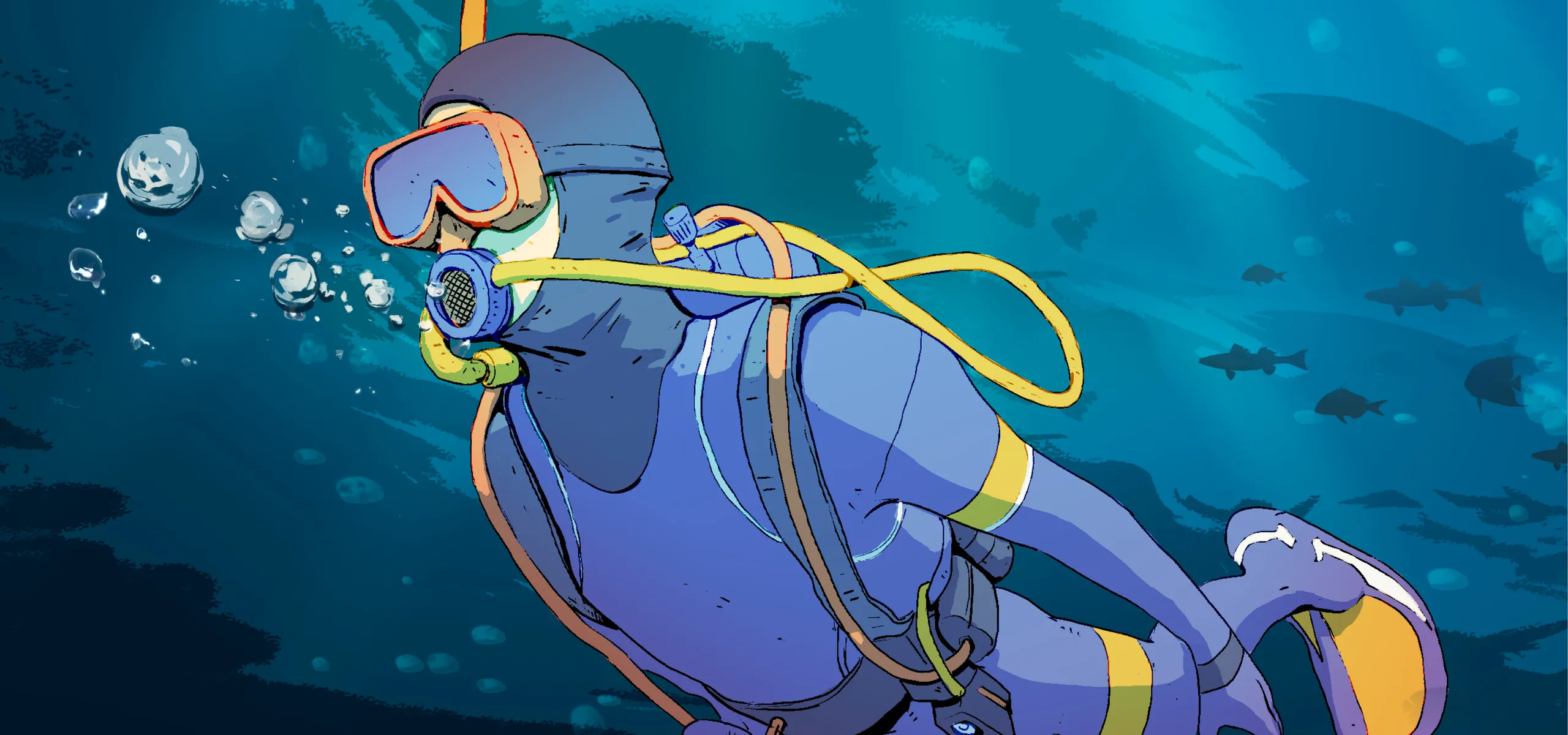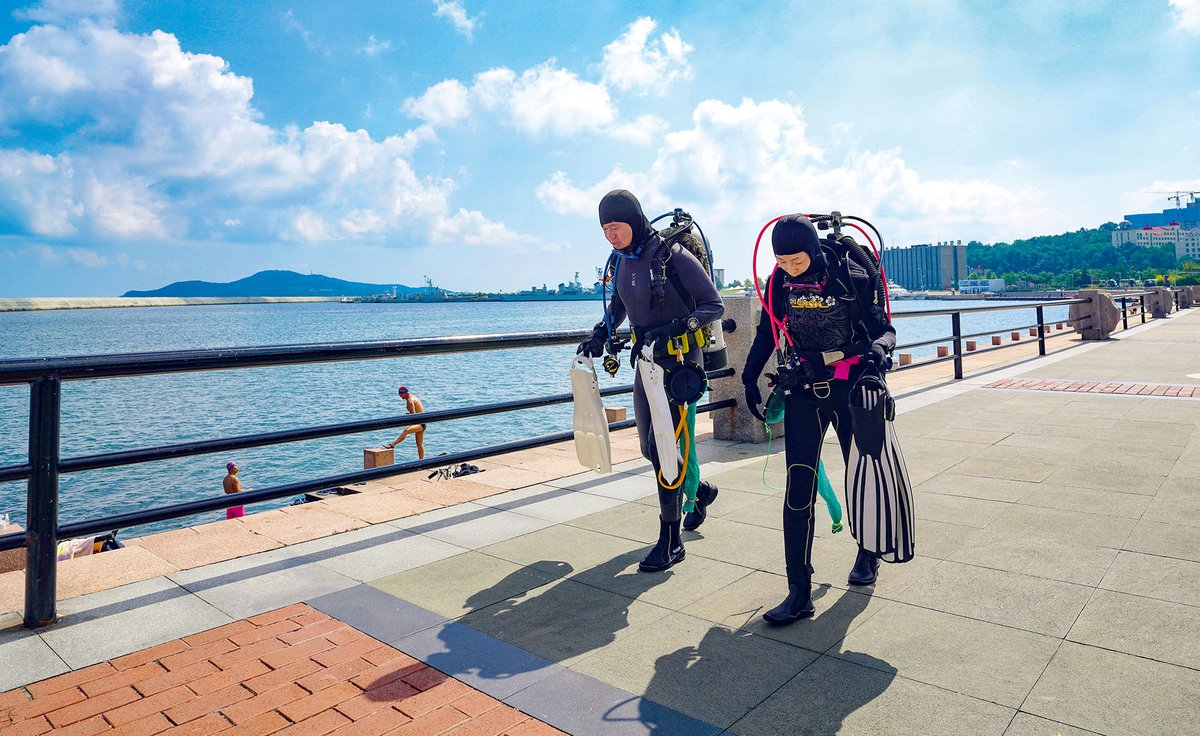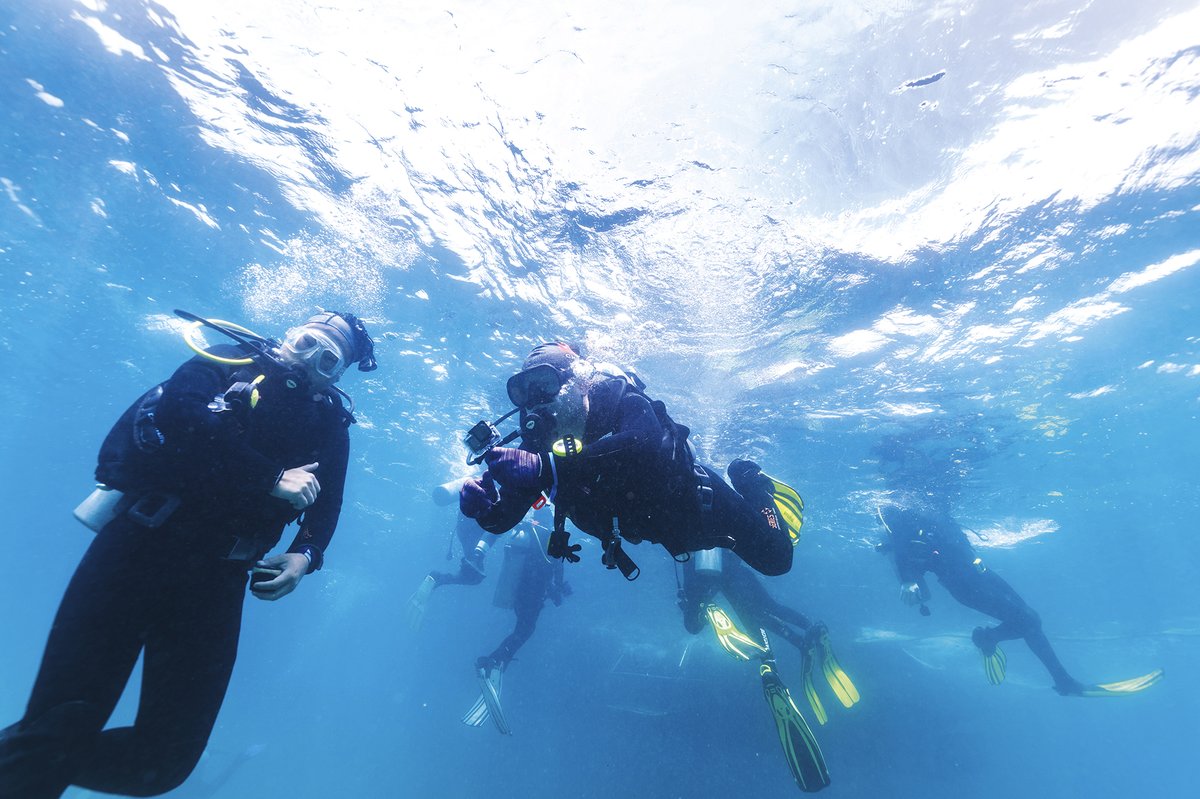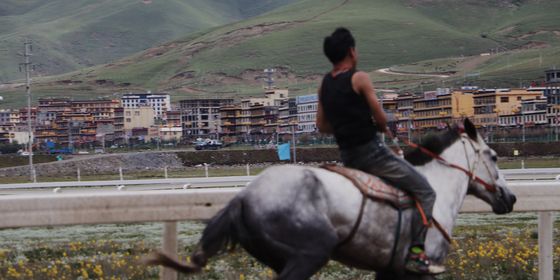Scuba divers seek more opportunities to practice their sport in Chinese waters...safely
Taking a plunge into the clear blue water off the Great Barrier Reef, swimming with turtles and manta rays off Komodo Island…for scuba diver Eva Fan, these experiences feel like a lifetime ago.
Fan is 30-year-old Beijing-based English teacher, who took up diving spontaneously while on vacation in Semporna, Malaysia, a few years ago. She had just passed an introductory course for more advanced diving in tropical waters when the Covid-19 pandemic shut off dream international destinations for Chinese travelers in 2020. Two years later, with border restrictions ongoing, China’s diving enthusiasts have been flocking to domestic diving sites, while trying to improve diving conditions and gain greater recognition for their sport within the country.
Under the recommendation of her Mexican coach, Fan tried to dive through the pandemic by trying Qiandao (“Thousand Island”) Lake in China’s eastern Zhejiang province. But instead of the balmy waters, schools of tropical fish, and colorful reefs she had trained for, she was faced with the unexpected challenge of a cold, dark lake. A single kick could stir up underwater sludge and reduce visibility to zero. “It was diving hell,” Fan tells TWOC.
Underwater diving is still a fairly unknown sport in China, and before the pandemic, domestic sites attracted few recreational divers thanks to challenging conditions and a lack of internationally credentialed diving instructors. Conversely, divers and instructors note that around 2015 overseas sites experienced a boom in the number of Chinese tourists going abroad to learn scuba diving, due to inexpensive prices and excellent underwater conditions. Southeast Asia became their top destination.
Covid put paid to that boom, with Chinese diving fans forced to look elsewhere. Domestic diving sites that have subsequently seen a wave of tourists include Wuzhizhou in Sanya and the city of Wanning, both on the tropical island of Hainan. According to travel app Feizhu, reservations for diving rose by 200 percent during 2021’s “Golden Week” holiday in October compared to the previous year, and searches for the term grew by 54 percent on shopping app Meituan.
Nevertheless, complaints about higher costs and poor seawater quality persist. A lack of good domestic sites for recreational diving has led some to explore technical scuba diving, a term coined in 1991 to describe a type of experience that goes deeper and longer than recreational scuba dives. This requires divers to learn advanced techniques as well as how to operate special equipment and how to work in a team to offset hazards such as toxic gases, decompression sickness, and oxygen supply failure, which can lead to serious injuries or death. Such training may require hundreds of hours and considerable expense.
Lü Yongsheng, a 54-year-old photographer who was eager to broaden his interests to underwater photography, started learning scuba diving in March 2019. In order to shoot at deeper levels, he started training in technical diving with international non-profit Global Underwater Explorers. He has spent hundreds of yuan on equipment, oxygen supplies (around 600 yuan per day), and practice sessions.
Yet for Lü, whose training has included learning to deal with stressful situations such as decompression (simulated by his coach using a bubble gun) and running out of oxygen underwater, there is another major barrier to entry for the sport: “The most challenging part for me is the innate fear,” he tells TWOC.
Technical diving is still a high-risk sport, and even seasoned divers who venture into unknown waters can meet with deadly consequences. In 2017, two scuba divers with high technical diving qualifications went missing while exploring a little-known flooded section of the Great Wall in Panjiakou, Hebei province. Their bodies were recovered 14 days later.
In 2021, two veteran technical divers died when taking a planned 120-meter-deep exploration of Jiutun underwater cave in Du’an in Guangxi. Known as the “Underwater Everest,” it is the deepest diveable cave in Asia that has been discovered so far. Though diving communities have tried to work out what went wrong, with limited information underwater, the causes of most diving accidents are unknown.
Chinese authorities also regard diving as a high-risk sport, and have taken steps to restrict diving clubs from operating. Unlike in many other countries popular with divers, the government owns the water resources in China, and diving clubs must get licenses to use them. With the exception of Hainan, no local governments have granted such permission to diving clubs since 2013. The right to use the waters at popular diving sites such as Qingshuitan in Guangxi, Lükutan in Guangdong province, and Panjiakou have all been prohibited, effectively banning diving in these areas.
This “one-size-fits-all” policy has pushed diving clubs into a gray zone, with many still operating without business licenses and the local government looking the other way as long as diving continues to bring tourists to the area—and as long as there are no major accidents. According to divers TWOC spoke to, some local officials may notify diving clubs to close temporarily ahead of inspections from higher-ups. Those who are injured or die while diving in such areas are considered to be “illegally diving” and must take legal responsibility for themselves, while any club involved with a fatality must simply shut down.
Yet Chen Xuan, a diving instructor certified by Global Underwater Explorers, tells TWOC that this all stems from a significant misunderstanding. “Diving is not a high-risk extreme sport,” he says. “Most people engaged in recreational diving, if they follow the rules, find it enjoyable.” Chen points out that just because a club is “illegal,” it is not necessarily unsafe, as professional clubs still follow rules set by international diving organizations, perform check dives to ensure conditions, and employ rescue divers. “We want to operate our club legally, but we have no policy support,” he says.
Like many high-risk sports with relatively short histories in China, such as skiing and surfing, diving does not have clear government-set standards for how operators and participants can enjoy the sport safely. “Skiing and surfing have been encouraged by the authorities [in recent years], but what about scuba diving?” says Chen.
For now, official Chinese efforts to legitimize diving are still confined to Hainan. Sanya began hosting an annual “diving festival” in 2021, inviting “internet celebrities” to shoot videos underwater in an effort to attract tourists, and offered a training course this July for local villagers to become diving coaches, in part aimed at easing local unemployment issues. The General Administration of Sport opened a national training center for scuba diving in Shimei Bay on the island this June, offering training and public education.
Ultimately, Chinese divers must still rely on training, equipment, good clubs, and their own judgment to stay safe underwater. “Understanding and accepting your limits is crucial to your safety. Don’t rush to push limits, and don’t dive beyond your own diving limits,” Chen suggests. “A diving license is not a license to explore [at will], and it’s hard to tell whether some divers with limited experience are qualified for risky dives.”
Fan is cognizant of the risks, but believes that with the proper training and attitude, technical diving is not necessarily more dangerous than recreational diving. Even the birth of her son this June has not slowed down her desire to continue training and exploring underwater.
She plans to go diving in Mexico as soon as the border reopens, already dreaming of the crystal-clear water, stunning cave formations, and top-level international technical divers she can meet and learn from there. “I felt so blessed with this isolated, peaceful aquatic world, where I could get away from everything in the surface world. I got addicted to this enjoyment,” she recalls from her first time diving.
Other divers agree the sport is addictive, and this is even supported by a science: A phenomenon known as the “diving reflex” can cause heart rate and blood pressure to lower as soon as the face is submerged underwater, giving divers a feeling of freedom. It’s little wonder that passionate divers call themselves “blue-drug” addicts, and that many divers in China are keen to continue their exploration despite the risks of diving in their own country—and long for the day they can finally plunge into unknown waters abroad.
“Whether I do an exploratory dive or not doesn’t matter much to me,” says Chen. “I just want to be back to the original essence of scuba diving: breathing underwater, enjoying the weightless feeling moment, and thinking about nothing.”
Additional reporting by Hatty Liu
Below the Surface: How Divers Navigate Bans and Travel Restrictions to Pursue their Passion is a story from our issue, “The Data Age.” To read the entire issue, become a subscriber and receive the full magazine.














